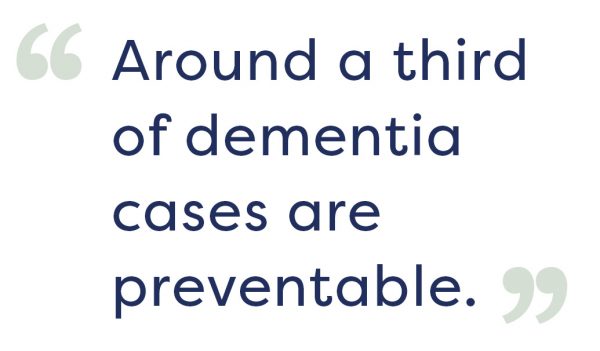10 things you need to know about dementia

It’s World Alzheimer’s Month and to help raise awareness we’re sharing 10 things you need to know about a disease that will affect over one million Brits by 2021.
Quick-fire facts:
- Dementia is now the UK’s biggest killer
- Someone develops the condition every three minutes
- Dementia and Alzheimer’s Disease aren’t actually the same thing
- Great charities like Alzheimer’s Society are taking on the disease
- There’s currently no cure
We did a deep dive on demystifying dementia earlier this year and, luckily for me, there were 10 blogs in the series, which meant I could grab one key takeaway from each and wrap it up into an easily digestible little nugget for you today.
1. What are Alzheimer’s Disease and dementia?
Alzheimer’s Disease is a type of dementia, which is just a way of describing different conditions that affect brain function. Dementia is way more than just memory loss though – it can cause hallucinations and changes in personality along with a whole host of other not-fun things.
Get the lowdown on what dementia actually is here.
2. Causes, signs and symptoms
There are actually four main types of dementia, and identifying which one you have early on can help make sure you get the right treatment. Taking medication that’s meant for another type can actually be quite dangerous.
Find out how to spot the signs and symptoms of different types of dementia here.
3. Getting the right support
Support really comes down to effective communication. Dementia affects everyone differently, which means everyone has their own way of dealing with it. The best way to bring dementia out of the shadows and get support is to talk about it – talk to a doctor, talk to your family and talk to your friends.
Discover all the ways you can access support here.
4. Managing your condition
You might think that getting diagnosed with dementia at least gives you a free pass to become a full time couch-potato but I’m here to burst your bubble. Staying active for as long as possible will help keep your mind and body on point so stay social, do gentle exercise and ask for help.
There’s more advice on managing your condition here.
5. Reduce your risk
Research suggests up to a third of dementia cases are preventable and reducing your risk actually isn’t rocket science – it’s all about looking after your health. In my case, that means minimising my impressive Wispa Gold intake but for others it might be looking at cutting back on smoking/alcohol, getting more sleep or putting less salt in their meals. Whatever works for you.
Discover the simple things you can do to take you out of that 33.3% risk group here.
6. Take action
Volunteering or fundraising are two vital ways to support the work of great charities like Alzheimer’s Society. This could involve anything from becoming a Side-by-Side volunteer, baking your heart out for a fundraiser, volunteering your time or taking part in events in your area, like the annual Glow Walk.
Take action against dementia here.
7. Mr S’s story
One of our customers, Mr S, kindly shared his experience of dementia with us. Surprisingly, the thing he found hardest to deal with wasn’t necessarily a symptom – it was the emotional impact of the condition.
“I was very annoyed at myself at this point in time,” says Mr S. “I was feeling very vulnerable and unsure of my future. This made me struggle with anxiety, sleepless nights and my mental health became unstable.”
Read Mr S’s blog to hear some of the hacks he came up with to manage his condition and his mental health.
8. Shout-out to the carers
Being a carer for someone with dementia might feel like being given the supporting role in a pretty bleak film. However, you’re not only an excellent person, it’s also as important that you get support yourself. Get straight on down to a GP who can put you on a carer’s register and let you know if you’re entitled to benefits, especially if it’s affecting your work life.
Get support as a carer here.
9. Society must unite against dementia
Contrary to popular belief life doesn’t end when dementia begins and with the right support in place people can keep doing the things they love. By becoming a Dementia Friend, or getting involved in other ways, you can help them to stay independent for longer.
Find out how to unite against dementia here.
10. Researching a brighter future
In the last couple of years research funded by Alzheimer’s Society has discovered new genes that play a role in the disease. Although they don’t tell us exactly who will and won’t get the disease, they give vital clues into why it starts in the brain. These clues could lead to future treatments.
Get the skinny on more ground-breaking research here.
11. Ask for help
Bonus point number 11 – and possibly the most important one – is that if you’re experiencing dementia, know someone who is or just want to help fight the disease, it’s always best to ask the experts. You are not alone.
You can find support near you with Alzheimer’s Society, and Onward customers can also contact our Older Persons team to find out more about the events we’re running and the support we offer. This includes running dementia cafes and adapting homes to suit a range of needs.
Get in touch to have a chat about more ways we can help you


